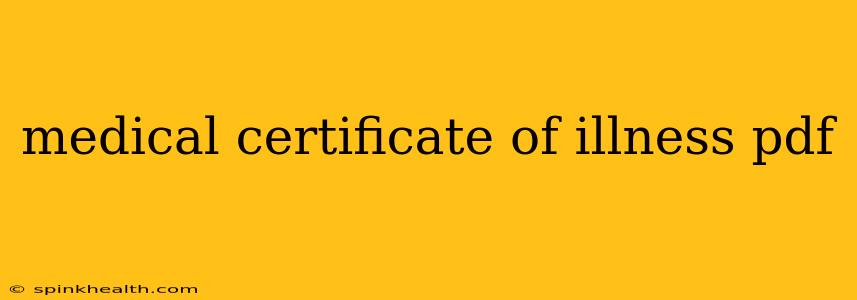Navigating the World of Medical Certificates of Illness: A Comprehensive Guide
The need for a medical certificate of illness (sometimes called a doctor's note, sick note, or fit note) often arises unexpectedly, disrupting routines and raising questions. This comprehensive guide will unravel the mysteries surrounding these important documents, answering your most pressing questions and providing valuable insights. Imagine this: you wake up feeling unwell, unable to go to work or school. The next step? Seeking medical attention and, subsequently, obtaining a medical certificate. But what exactly is a medical certificate of illness, and how do you navigate the process? Let's dive in.
What is a Medical Certificate of Illness?
A medical certificate of illness is an official document issued by a licensed medical professional, such as a doctor or physician's assistant, confirming an individual's illness or injury and their inability to perform their usual duties. These certificates typically detail the nature of the illness, the duration of the incapacitation, and sometimes include recommendations for recovery or restrictions on activity. The specific format and content may vary slightly depending on the country, institution, and individual doctor's practice. It's essentially a formal record of your illness, providing proof to employers, educational institutions, or other relevant parties.
Where can I get a Medical Certificate of Illness?
You can obtain a medical certificate of illness by visiting a licensed medical professional, such as your general practitioner (GP), or a doctor at a clinic or urgent care facility. The process usually involves a consultation where the doctor will assess your condition, conduct any necessary examinations, and then issue the certificate if warranted. The doctor will determine the appropriate length of time you need to be off work or school, basing this on the severity of your illness. Remember, you can't simply generate one yourself; it must come from a qualified medical practitioner.
How long is a Medical Certificate of Illness valid for?
The validity period of a medical certificate of illness is not standardized and varies depending on several factors: the nature and severity of your illness, the doctor's assessment, and the specific requirements of your employer or institution. Some certificates might cover a few days, while others might extend to several weeks or even months in the case of a more serious illness or injury requiring extended recovery time. Always check with your doctor and the receiving institution to clarify the expected duration and any specific requirements.
What information is included in a Medical Certificate of Illness?
A typical medical certificate of illness usually includes the following information:
- Patient's details: Full name, address, date of birth, and contact information.
- Doctor's details: Name, address, qualifications, and contact information of the issuing doctor.
- Date of examination: The date the doctor examined the patient.
- Diagnosis: A brief description of the illness or injury.
- Period of incapacity: The dates the patient is unable to work or attend their normal duties.
- Doctor's signature and stamp: Authenticating the certificate's legitimacy.
- Sometimes: Recommendations for recovery, restrictions on activity, or a return-to-work plan.
Is a Medical Certificate of Illness always required for absences?
While not always mandatory, a medical certificate of illness is often required for extended absences from work or school, particularly if the absence is unplanned or prolonged. Your employer or institution may have specific policies regarding sick leave and the documentation required to support such leave. It is best to always check your company or school's policies on sick leave to avoid any misunderstandings.
Can I get a Medical Certificate of Illness online?
While you can schedule appointments and sometimes receive initial consultations online, obtaining a legitimate medical certificate of illness typically requires an in-person examination by a qualified medical professional. This is crucial for proper diagnosis and responsible medical practice. Beware of websites offering to provide medical certificates without a physical consultation, as these are often illegitimate and may not be accepted by employers or institutions. Your health and the integrity of the documentation are paramount.
This guide provides a starting point for navigating the complexities of medical certificates of illness. Remember, always consult a qualified medical professional for any health concerns and adhere to the policies of your employer or institution regarding absences and documentation.

